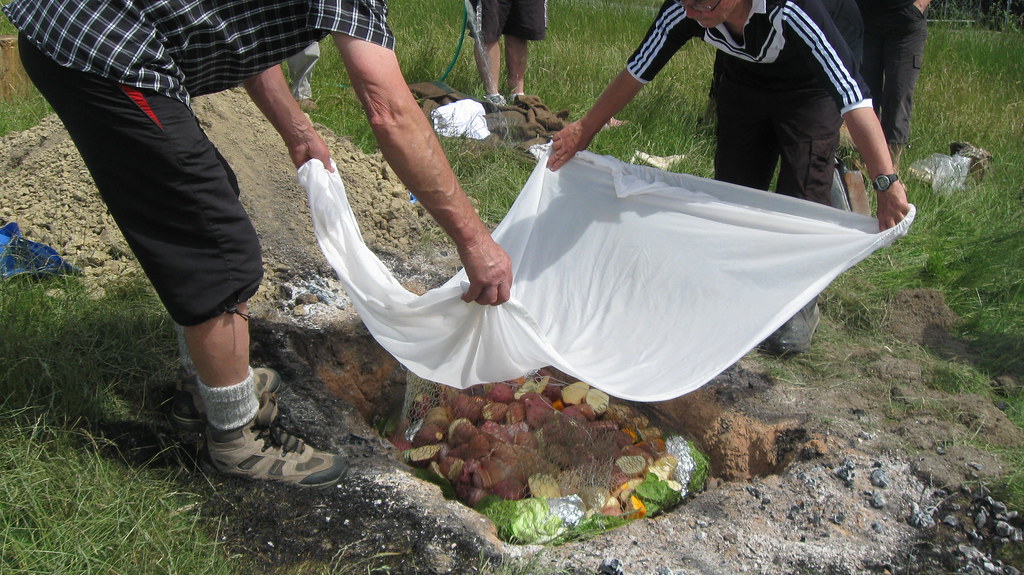Exploring The Māori Hangi

France has escargot, and America has the iconic hot dog. In New Zealand, there can be no other iconic food favorite that intertwines tradition, culture and flavor than the Māori hangi. While hangi refers to the method of cooking the cult Kiwi classic, the term also includes the many sumptuous foods that are included in the cooking process. While many other Pacific nations have their own versions, including the Samoan umu, the hangi is unique to New Zealand’s Māori.

Hangi refers to the traditional method of cooking food using heated rocks buried in a pit oven. However, due to the vast landscape, varying climates and natural topography of New Zealand, hangi is done with some slight regional variations. On the East Cape of the North Island, manuka wood is mainly used to the heat the stones, due to the prevalence of manuka in the area. As such, East Coast hangi is often done with a hint of manuka that is infused into the rich meats and vegetables. Contrastingly, in Rotorua, in the central North Island, where geothermal activity is widespread, hot stones are not used at all. Traditionally, the local Ngati Whakauae tribe would place selected foods in flax baskets, and instead of burying these in grounded pits, they would put them directly into hot springs and geysers to cook within a matter of minutes.

The term hangi refers to not only the cooking method but also the food. Again, due to the vast landscape, ingredients used vary from region to region. In the lakes area of Rotorua and Taupo, trout and eel are often placed in hangi pits and geysers. On the East Cape where the agricultural industry thrives, pork, beef and mutton often fill their local hangi pits. Similarly, being so close to the coastline, East Coast tribes often include a variety of seafood from crayfish and paua to mussels and other shellfish. Travelling further to the bottom of the country and in the South Island, local tribes cook mutton birds in their hangi pits. As a local delicacy and predominantly found in the South, mutton birds and seals are what make the Ngai Tahu tribal hangi so unique.
Since you are here, we would like to share our vision for the future of travel - and the direction Culture Trip is moving in.
Culture Trip launched in 2011 with a simple yet passionate mission: to inspire people to go beyond their boundaries and experience what makes a place, its people and its culture special and meaningful — and this is still in our DNA today. We are proud that, for more than a decade, millions like you have trusted our award-winning recommendations by people who deeply understand what makes certain places and communities so special.
Increasingly we believe the world needs more meaningful, real-life connections between curious travellers keen to explore the world in a more responsible way. That is why we have intensively curated a collection of premium small-group trips as an invitation to meet and connect with new, like-minded people for once-in-a-lifetime experiences in three categories: Culture Trips, Rail Trips and Private Trips. Our Trips are suitable for both solo travelers, couples and friends who want to explore the world together.
Culture Trips are deeply immersive 5 to 16 days itineraries, that combine authentic local experiences, exciting activities and 4-5* accommodation to look forward to at the end of each day. Our Rail Trips are our most planet-friendly itineraries that invite you to take the scenic route, relax whilst getting under the skin of a destination. Our Private Trips are fully tailored itineraries, curated by our Travel Experts specifically for you, your friends or your family.
We know that many of you worry about the environmental impact of travel and are looking for ways of expanding horizons in ways that do minimal harm - and may even bring benefits. We are committed to go as far as possible in curating our trips with care for the planet. That is why all of our trips are flightless in destination, fully carbon offset - and we have ambitious plans to be net zero in the very near future.












